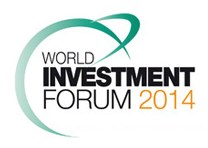Representatives of governments, the UN and businesses considered solutions for financing the Sustainable Development Goals (SDGs) during their discussions at the World Investment Forum 2014.
The UN Conference on Trade and Development (UNCTAD), which organizes the annual Forum, has estimated that developing countries will face an annual investment gap of US$2.5 trillion over the lifetime of the SDGs (2016 to 2030), and public resources will not be able to meet the SDG-implied financial demands.
 16 October 2014: Representatives of governments, the UN and businesses considered solutions for financing the Sustainable Development Goals (SDGs) during their discussions at the World Investment Forum 2014. The UN Conference on Trade and Development (UNCTAD), which organizes the annual Forum, has estimated that developing countries will face an annual investment gap of US$2.5 trillion over the lifetime of the SDGs (2016 to 2030), and public resources will not be able to meet the SDG-implied financial demands.
16 October 2014: Representatives of governments, the UN and businesses considered solutions for financing the Sustainable Development Goals (SDGs) during their discussions at the World Investment Forum 2014. The UN Conference on Trade and Development (UNCTAD), which organizes the annual Forum, has estimated that developing countries will face an annual investment gap of US$2.5 trillion over the lifetime of the SDGs (2016 to 2030), and public resources will not be able to meet the SDG-implied financial demands.
The Forum convened from 13-16 October 2014, in Geneva, Switzerland. Participants explored how the private sector, as well as investors such as state-owned firms and sovereign wealth and public pension funds, can contribute to achieving the SDGs through financial market reforms, risk-sharing measures, and tools such as green bonds and specialized investment funds.
During the first session of the Forum, participants said a lack of investment and absence of coordinated leadership to address critical financing needs in developing countries could threaten efforts to reduce poverty and tackle issues such as climate change. Speakers at the second session debated ways to increase investment to critical areas, such as infrastructure, energy, health, and education, where the demand is growing while public budgetary constraints have led to calls for increased private funding.
UNCTAD Secretary-General Mukhisa Kituyi said, “as strange as it may seem, there are investors who are sitting on cash that they cannot invest for lack of adequately packaged or large enough projects.” In its World Investment Report 2014, UNCTAD identified almost US$200 trillion of assets in the global financial system, some of which could be reoriented to sustainable development outcomes.
Mark Wilson, Aviva, noted that “We want everyone in the investment process to think long-term. [We need] a vision of patient capital not hot money.” David Carter, Speaker of the House of Representatives, New Zealand, said, “The UN has an important contribution to make as an enabler of sustainable development.”
Atsushi Saito, Japan Exchange Group, noted the need to change mindsets and mobilize finance into what are perceived to be high-risk sectors in often unfamiliar markets. He suggested adopting regional approaches to infrastructure development, which can help reduce risks for investors through diversification. Zhou Zhongshou, China Minmetal, said transnational corporations should recruit local staff and preserve the local ecosystem. [Forum Website] [UNCTAD Press Release First Session] [UNCTAD Press Release Second Session] [UNCTAD Press Release, 7 October 2014]